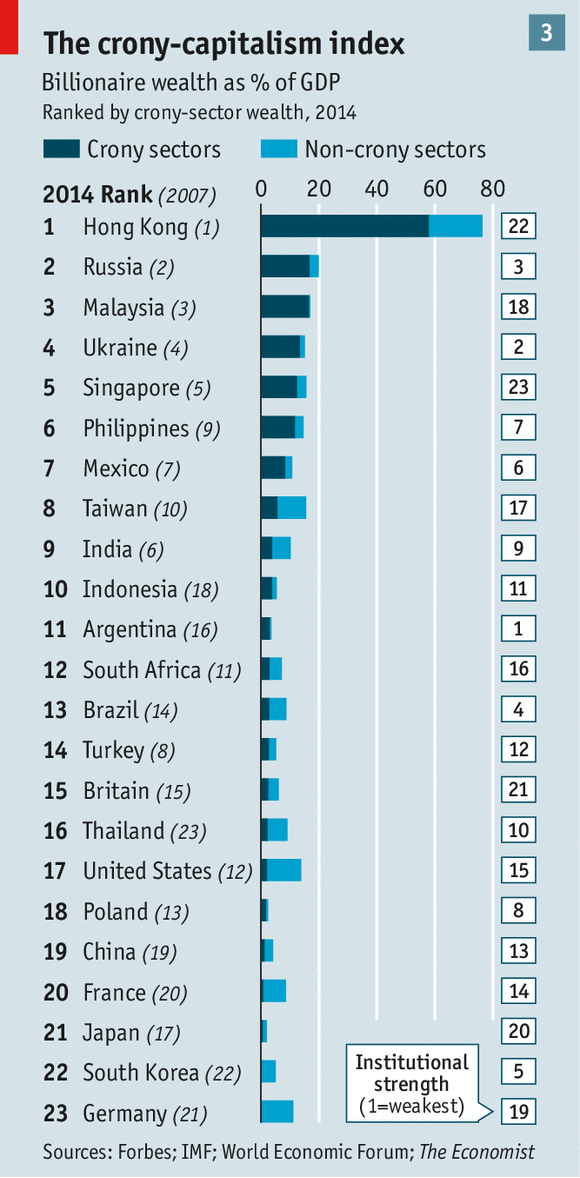Read the full article via The Economist. Below is a quick summary of the pertinent points:
Why it is bad:
Inventing a better widget, tastier snack or snazzier computer program is one thing. But many of today’s tycoons are accused of making fortunes by “rent-seeking”: grabbing a bigger slice of the pie rather than making the pie bigger. In technical terms, an economic rent is the difference between what people are paid and what they would have to be paid for their labour, capital, land (or any other inputs into production) to remain in their current use. In a world of perfect competition, rent would not exist. Common examples of rent-seeking (which may or may not be illegal) include forming cartels and lobbying for rules that benefit a firm at the expense of competitors and customers.
Class warriors and free-market devotees alike are worrying about rent-seeking. American libertarians fear an elite has rigged their country’s economy; plenty of ordinary Joes reckon the government and Federal Reserve care more about Wall Street than Main Street. Many hedge-fund managers sniff that China is a house of cards built by indebted cronies.
Methodology:
To test the claim that rent-seekers are on the rampage, The Economist created a crony-capitalist index. Their approach builds on work by Ruchir Sharma of Morgan Stanley Investment Management, Aditi Gandhi and Michael Walton of New Delhi’s Centre for Policy Research, and others. They use data from Forbes to calculate the total wealth of those of the world’s billionaires who are active mainly in rent-heavy industries, and compare that total to world GDP to get a sense of its scale. They show results for 23 countries—the five largest developed ones, the ten largest developing ones for which reliable data are available, and a selection of eight smaller ones where cronyism is thought to be a big problem. The higher the ratio, the more likely the economy suffers from a severe case of crony-capitalism.
They have included industries that are vulnerable to monopoly, or that involve licensing or heavy state involvement. These are more prone to graft, according to the bribery rankings produced by Transparency International, an anti-corruption watchdog. Some are obvious. Banks benefit from an implicit state guarantee that lowers their cost of borrowing. When publicly owned coal mines, land and telecoms spectrum are handed to tycoons on favourable terms, the public suffers. But the boundary between legality and graft is complex. A billionaire in a rent-heavy industry need not be corrupt or have broken the law. Industries that are close to the state are still essential, and can be healthy and transparent.
The Crony-Capitalist Index:

Why is Singapore ranked fifth?
Countries that do well on the crony index generally have better bureaucracies and institutions, as judged by the World Economic Forum. But efficient government is no guarantee of a good score: Hong Kong and Singapore are packed with billionaires in crony industries. This reflects scarce land, which boosts property values, and their role as entrepots for shiftier neighbours. Hong Kong has also long been lax on antitrust: it only passed an economy-wide competition law two years ago.
Any thoughts? Please leave a comment. 🙂



![[Review] Be Our Guest to a Night of Enchantment with Disney’s Beauty and the Beast in Singapore This December [Review] Be Our Guest to a Night of Enchantment with Disney’s Beauty and the Beast in Singapore This December - Alvinology](https://media.alvinology.com/uploads/2025/12/Screenshot-2025-12-14-195843-110x110.png)

![[Review] Tim Ho Wan’s Limited Edition East-Meets-West Menu Brings Festive Flavours to Dim Sum [Review] Tim Ho Wan’s Limited Edition East-Meets-West Menu Brings Festive Flavours to Dim Sum - Alvinology](https://media.alvinology.com/uploads/2025/12/6194907278834600928-110x110.jpg)







